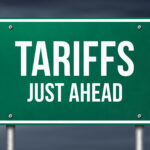The Impact of Election Season on the Markets

In case you missed it, there is a presidential election happening this year. Many of our clients are wondering what this may mean for their investments. Historically, the stock market’s performance in election years has shown certain trends, shaped by political uncertainty, economic policies, and market sentiment.
Certainly, the market has a lot of things going in its favor. First, the U.S. economy (and global economy for that matter) will likely continue to grow. Second, rates are coming down as labor markets cool, renewing rate cut hopes. Third, earnings are growing at a solid pace and will likely continue to do so through 2024 and 2025. Pullbacks will come, but if you look back at what causes 10%-plus corrections, they can almost always be tied to deteriorating corporate profits, as experienced in 2008, 2015, 2020, and 2022.
However, Election years are typically marked by heightened volatility. Uncertainty about the potential outcome and the future direction of government policies can lead to increased market fluctuations. Markets strongly dislike uncertainty, thus leading to chaotic movements in the weeks and months preceding an election. A clear and decisive victory can lead to market rallies as uncertainty is resolved. Conversely, a contested election or a significant policy shift can result in market downturns as investors recalibrate their strategies to align with the new political landscape.
Markets tend to favor the incumbent party, especially if the economy is performing well. Historically, if the sitting president or their party is likely to win, the market shows more stability and positive performance. This can be attributed to the market’s preference for continuity and the known economic policies of the incumbent administration. Remember markets are mostly interested in knowing what’s coming. Speculation will be rampant surrounding post-election policy changes, which is understandable. Taxes will likely rise when the Trump tax cuts expire next year no matter who is elected. But with narrow majorities in Congress, 2025 relatively far and solid corporate fundamentals, I expect pullbacks could be relatively shallow.
Different sectors respond uniquely to the political climate. For instance, defense stocks may rally if the incumbent administration is perceived as strong on national security, while renewable energy stocks might benefit from a candidate with a green agenda. Health care, technology, and financial sectors also experience varying degrees of impact based on the anticipated regulatory and fiscal policies of the potential administration.
While short-term volatility is a hallmark of election years, long-term investors often benefit from maintaining a steady course. Historical data suggests that despite the ups and downs during election years, the overall trend of the stock market remains upward. Staying invested and not reacting impulsively to political events is usually the best strategy.
In conclusion, while election years bring a unique set of challenges and uncertainties to the stock market, they also present opportunities. By understanding historical trends and maintaining a long-term perspective, investors can navigate the election-year turbulence more effectively. The key is to stay informed, avoid knee-jerk reactions, and focus on the broader economic indicators that drive market performance beyond the political noise. One piece of advice is to make sure you are following your investment policies. Your allocations should fulfill specific roles in your portfolio. By having a set of investment rules, it helps to weed out the “noise” that can sometimes lead to emotional investment decision making. If you aren’t sure if your current portfolio is working as hard as it should for you, please give us a call. As always, we are happy to help. .
 ASHLEY ROSSER, PRESIDENT
ASHLEY ROSSER, PRESIDENT
Prior to her career in the financial services industry, Ashley earned her Bachelor of Science in Nursing from Cedarville University.
Ashley decided to make a career change from her ten years within the healthcare industry as a pediatric emergency room nurse to retirement and 401K investment planning. She joined Victory Fiduciary Consulting in 2008 after obtaining her Series 65 professional financial license and went on to earn her AIF (Accredited Investment Fiduciary) professional designation from the Center for Fiduciary Studies.












